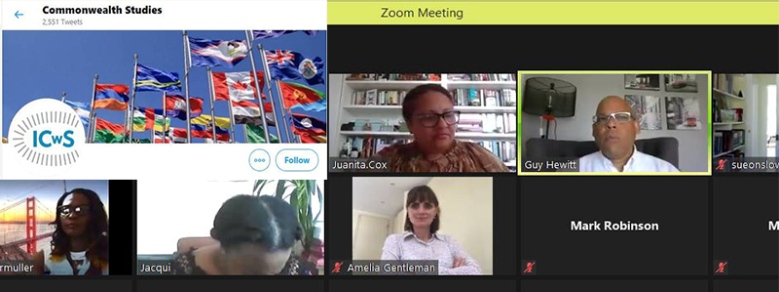The Windrush scandal and the Commonwealth

By Debbie Ransome
If there was one thing all the panellists agreed on at a recent discussion on the Windrush scandal, it was that the UK’s so-called hostile environment had been years in the making.
The event took place under the umbrella of a day-long virtual conference entitled Taking Stock of the Commonwealth, organised by the Institute of Commonwealth Studies and based at the School of Advanced Study at the University of London.
However, the geography didn’t matter, given the Zoom-led virtual world of conferencing in the summer of 2020. Despite the physical distance between them, participants from the UK and the Caribbean ably summed up the historical events leading to the scandal.
The session - The Windrush Scandal: Developments since the 2018 CHOGM - featured an illustrious cast:
- Rev Guy Hewitt, former Barbados High Commissioner to the UK who had piloted the diplomatic moves to highlight the Windrush scandal
- UK Guardian journalist Amelia Gentleman, whose reporting put the Windrush scandal on the front pages of the British press
- Dr Laura Jan Obermuller, whose work at the University of the West Indies followed the people returning to Jamaica both voluntarily and through deportation
- and Jacqueline McKenzie, lawyer with firm McKenzie Beute and Pope, which works closely with those affected by the Windrush scandal.
Guy Hewitt opened the session by outlining how the hostile environment had developed. He looked at how both Conservative and Labour governments had denied people of the Windrush generation the status owing to them under the 1948 Citizen Act. He said people in the Caribbean had been confused by expectations of a “British sense of fair play” in the growing environment that trapped some of the Windrush generation and their children. He explained how he had pushed his fellow Caribbean diplomats in London to be more “action-oriented” - within diplomatic boundaries - in highlighting the plight of those asked to return home because of a lack of paperwork and those threatened with deportation. He explained how a “coalition of the willing” had been formed with diplomats, the Church of England, civil society and reporters to engage in activism in the run-up to the Commonwealth Heads of Government Meeting (CHOGM) in April 2018. This had created the “perfect storm” for a UK government about to become Chair-in-Office of the Commonwealth and dealing with the “human face” of the scandal which the newspapers had provided. Prime Minister Theresa May had eventually been forced to meet Caribbean diplomats and some leaders ahead of the CHOGM as regional prime ministers joined their colleagues for the London summit.
Dr Obermuller outlined some of the results from her work at UWI’s Mona campus, researching what had happened to the people who had chosen the voluntary return process option offered by the UK. They had found themselves viewed with suspicion in Jamaica, while their legal aid was cut off, damaging their ability to apply for British citizenship. “You just fall by the wayside... their lives have been disrupted,” Dr Obermuller explained.
The Guardian’s Amelia Gentleman, who had won several awards for her reporting on the Windrush scandal, also outlined the development of Britain’s hostile environment going right back to 1948. She said people had been pushed into a grey area in terms of the UK’s changing immigration rules and had found themselves moved “invisibly” from being in the UK legally to being there illegally. When the UK started to crack down on migration levels in 2010, some of the Windrush generation had begun to find their right to stay questioned, with some unable to return “home” after Caribbean visits: they were now on the wrong side of the law. She also outlined how migration had moved up the British political agenda with the rise of right-wing parties. By 2014, people who had thought they’d been in the UK legally found themselves asked to leave voluntarily or apply for citizenship.
Attorney Jacqui McKenzie had moved from working with a Caribbean high commission to help its nationals legalise their status as the hostile environment developed, to becoming part of a mainstream legal support network for those caught in the Windrush headlights. She said the UK’s hostile environment had developed because everybody had been “acting to the gallery on this [migration] issue”. She outlined the current situation in which the Home Office, which she insisted could resolve the situation overnight, had made low offers to Windrush victims and made others work hard to prove their right to remain in the UK.
The Q&A session which followed allowed panellists to discuss the current hostile environment. Some described it as difficult to unpick without long-term education, while others saw it as an issue of dealing with “racist” responses to the plight of those affected. Panellists pointed out that two-thirds of existing recommendations from official reports into the situation could be implemented immediately – that is, with the right political will. There was discussion about the existing support network to help those affected and the lack of political will on the part of the Caribbean Community (CARICOM) to push further on this issue.
Was the existing hostile environment an aberration, caused by an historic perfect storm and changing attitudes to migration in the UK? “The evidence is in their actions,” answered one of the panellists.
[Debbie Ransome is the former Head of BBC Caribbean and currently manages the website CaribbeanIntelligence.com.]


